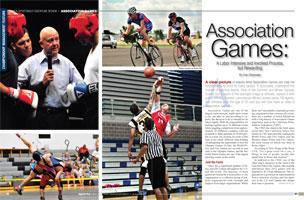
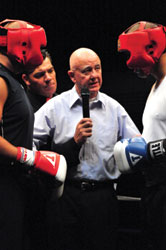 A clear picture of exactly what Association Games are may not initially come to mind for many people. To accurately understand this market of sporting events,think of the Summer and Winter Olympic Games but in place of the standard image of athletes, replace it with police officers, firemen, correctional officers, border patrol, FBI Agents, and athletes over the age of 50 and you will now have an idea of Association Games.
A clear picture of exactly what Association Games are may not initially come to mind for many people. To accurately understand this market of sporting events,think of the Summer and Winter Olympic Games but in place of the standard image of athletes, replace it with police officers, firemen, correctional officers, border patrol, FBI Agents, and athletes over the age of 50 and you will now have an idea of Association Games.
Association Games are one of the largest, most intricate, multi-sport events a city can take on, and according to experts, the decision to do so should not be taken lightly. With the responsibility for putting together up to 70 different events while juggling competitors from approximately 60 different countries with the potential to draw upwards of 35,000 people to a host city, hosting an event of this type is not much different than bidding on and gaining the opportunity to host the Olympic Games. In fact, the World Police and Fire Games are second in size only to the Olympic Games, and the National Senior Games are one of the largest sporting events in the world.
Just the Facts
There are a significant number of Police and Fire Games throughout the U.S. and the world. The majority of these games are hosted by a local police or fire organization or a collective group of separate organizations with oversight and support from larger organizations. While there isn't necessarily a national governing organization that oversees all events, there are a number of noted federations with a long history of Association Games experience such as the California Police Athletic Federation (CPAF).
The CPAF, the oldest in the field, sponsored their first California Police-Fire Games in 1967 and currently oversees the World Police and Fire Games and the Western States Police and Fire Games, the most recent of which was held in Boise, Idaho.
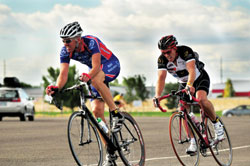 According to Terry Kopp of the Boise CVB, "It's a great event for a city; it brings in lots of people, people who spend time in Boise and vacation."
According to Terry Kopp of the Boise CVB, "It's a great event for a city; it brings in lots of people, people who spend time in Boise and vacation."
In addition to the CPAF, one of the other major sponsors in the field is the Can-Am Police-Fire Games, who recently announced their 2012 games will be awarded to St. Cloud, Minnesota. This organization is governed by representatives from a selection of police and fire agencies in the U.S. and Canada who donate their time to promote the physical fitness of its athletes and to build community.
These are not the only groups responsible for hosting games as, over the past few years, groups not affiliated with a police or fire organization have begun successfully hosting Games. Regardless of the host organization, though, these events cannot be successful without the support of local fire and police departments and organizations.
Duke Nyhus, executive director of the CPAF, says, "The Games have to be supported by these groups so [organizers] can go ahead and proceed with an event of this size."
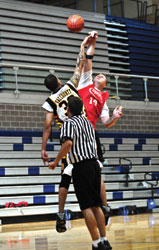 Senior Games are different from Police-Fire games in that the games are governed by the National Senior Games Association, a member of the U.S. Olympic Committee. For an athlete to compete in the National Senior he/she must first compete in and place in one of the State Games, which occur in 49 states as well as in the District of Columbia and Europe in the years between the National Games.
Senior Games are different from Police-Fire games in that the games are governed by the National Senior Games Association, a member of the U.S. Olympic Committee. For an athlete to compete in the National Senior he/she must first compete in and place in one of the State Games, which occur in 49 states as well as in the District of Columbia and Europe in the years between the National Games.
Parade of Athletes
Generally speaking, participation in most sporting events is open to any competitor who qualifies or is part of a qualifying team. This is not the case with athletes participating in Association Games. To compete in a Police and Fire Games, an athlete either has to currently be working in law enforcement or as a firefighter, or be retired from one of the professions. Any athlete wishing to compete in a Senior Game must be 50 years or older at the time of competition. This may sound like it limits the number of participants thereby limiting the opportunity to draw large groups to a host city, but it's actually the opposite. The World Police & Fire Games draws 10-12,000 full-time firefighters and police service officers from 70 different countries and the Western States Police and Fire Games draws 15,000-30,000 visitors to a host city.
Association Games provide athletes competition in as few as 15 sports and as many as 70 including, among many others, basketball, softball, swimming, track & field, and weightlifting, as well as other less traditional events like billiards, cook offs, darts, judo and water skiing.
The 2009 National Senior Games offers 18 medal-worthy events as well as an additional seven demonstration sports. The World Police and Fire Games offers over 65 events, more than the Summer and Winter Olympic Games combined. The Can-Am Police-Fire Games requires hosts to offer 33 games but also says, "The size of the games is only limited by a community's efforts to market them." Unlike many sporting events where the competition scan be confined to one day or over the course of a weekend, Association Games range over several days, some up to 15 days. The Games can also span several different cities within a general region. Because of the wide range of activities provided, venue selection and acquisition is a major factor for anyone considering hosting an Association Games event.
The Games Go To...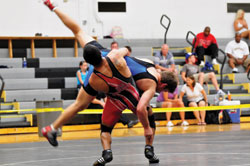 For any city or organization preparing to bid on Association Games, one of the first tasks is locating and securing appropriate venues because there are many that are required. These venues include gymnasiums, swimming pools, softball fields, golf courses, track and field facilities, racquetball courts, tennis facilities and archery, skeet and pistol ranges. As Nyhus points out, "There is something for everybody [but] it is a major undertaking and it requires quite a substantial investment in time and money to secure venues, officials, infrastructure and volunteers."
For any city or organization preparing to bid on Association Games, one of the first tasks is locating and securing appropriate venues because there are many that are required. These venues include gymnasiums, swimming pools, softball fields, golf courses, track and field facilities, racquetball courts, tennis facilities and archery, skeet and pistol ranges. As Nyhus points out, "There is something for everybody [but] it is a major undertaking and it requires quite a substantial investment in time and money to secure venues, officials, infrastructure and volunteers."
Because taking on an Association Games event is such a labor intensive and involved process, the Can-Am Police-Fire Games, in their hosting materials, are fairly direct with interested organizations. The Can-Am Games organization states up front that the job is not for just anyone and that the task requires roughly 2,000 hours of commitment leading up to and after the games.
Any city can host an Association Game if they are willing to go through the necessary processes and take on the responsibilities that are associated with bidding on and hosting the event. As is the case with most multi-sport, multi-day events,the bidding process begins several years in advance of the actual date, some in excess of four years prior. Most of the major governing and sponsoring organizations offer a wealth of in-depth information. In fact, for the Police and Fire organizations the websites provide step by step bidding procedures and offer interested parties incredibly useful information. Even with so much guidance available there are additional elements that may not necessarily be covered in the "how-to" guides but are equally as important when considering bidding on an Association Games event.
One of the primary keys to hosting a successful Association Game is volunteers. Because there are so many events taking place simultaneously and in so many locations, one group of people cannot oversee everything. Josh Bricker,Sports & Events manager for the Dublin, Ohio CVB, host of the 2010 Can-Am Games, says they are working with 100 volunteers to create the budgets, obtain equipment and generate a games committee which includes a sports director, but when the event arrives they will have 500 volunteers.
The sports director "is extremely important because this is the person who will oversee every sport and the person who is responsible for finding volunteers," says Bricker. In terms of enlisting assistance, Bricker adds, "The best thing to do is make sure the volunteers are experts in the field. If they have that passion, they will put on the best competition for their sport." Bricker also admits, "A big challenge is the logistics of everything. With 50 events to put on, it's proving to be a little tough; the information we've received from Can-Am has helped.But for every situation have a back-up plan."
In addition to having a solid volunteer base and community support, there are a handful of other things that can be done to ensure a successful event. Nyhus says, "There are so many things that should be done to make this memorable [but] there is one thing that attracts the athletes, and is a must, and that is a parade of athletes. They live vicariously through Olympians and it's great for them to parade around the track and get recognition."
Nyhus also encourages organizers to plan quality opening ceremonies but offers a word of caution. "It doesn't require a lot of the high priced talent. If you have a nice parade of athletes and a program NOT filled with long boring speeches and a nice social event, you will likely be successful." Nyhus points out that the quality of competition, the venues and the sports should be primary concerns.
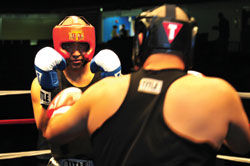 An issue facing organizers putting together events like the National Senior Games or the World Police and Fire Games,where competitors are coming from all over the world, is a language barrier. Not all of these competitors are going to speak English and this should be considered when finding venues and hotels due to the fact that transportation may be challenging for some. Also, for those traveling from other countries, money is a factor.
An issue facing organizers putting together events like the National Senior Games or the World Police and Fire Games,where competitors are coming from all over the world, is a language barrier. Not all of these competitors are going to speak English and this should be considered when finding venues and hotels due to the fact that transportation may be challenging for some. Also, for those traveling from other countries, money is a factor.
Sponsors are a vital component to the success of Association Games. However,due to the global economic climate, cities and organizations in the midst of planning and executing their Games are feeling the effects of dwindling sponsors. One of the most recent examples was the World Police and Fire Games in Boise, Idaho where attendance was down and the organizers had to make adjustments to ensure that the event went off as successfully as possible. Kopp, however, confidently points out, "The games were great and people had a great time. We would have them back again."
Bicker has similar concerns. "Our biggest challenge, no matter what, is finding sponsors due to the economy. It's challenging trying to find sponsors to step up but it's our job to show how great it is." His advice to a city interested in bidding on the Games is "just show off your city and what it can offer and that will lead to what you can do for the event and how you can make it successful."
Go for the Gold
Association Games are not for the faint of heart, either as a competitor or as a host city or organization. There is a lengthy list of factors to consider and the amount of work that must be done before the games are ever awarded can make it almost seem not worth it to attempt to host these games. In some cases this may be true. But while there is no denying the significant economic advantages and notoriety that accompany Association Games, there are other intangible reasons to host these events.
The opportunity to bring these extraordinary groups of competitors to your city, to have the opportunity to see some of the finest athletes in the world compete against one another even after many people have told them they're past their prime, as well as the opportunity to give back to a group of civil servants who give so much to their communities every day might just prove to be worth it.
Organizations
2009 Summer National Senior Games
Arizona Police and Fire Games
Colorado Police and Fire Games
Fifty-Plus Fitness Association (FPFA)
International Association of Physical Activity, Aging and Sports (IAPAAS)
National Senior Games Association
New York City Sports Commission
Palm Beach Sports Commission
Texas Senior Games Association
United States Firefighter Games
U.S. Olympic Committee
Contacts
Boise Convention & Visitors Bureau
Terry Kopp – Director of Sales
Email: tkopp@boisecvb.org
California Police Athletic Federation
Duke Nyhus – Executive Director
E-mail: 4info@cpaf.org
Dublin Convention & Visitors Bureau
Joshua Bricker – Sports and Events Sales Manager
Email: jbricker@IrishisanAttitude.com

